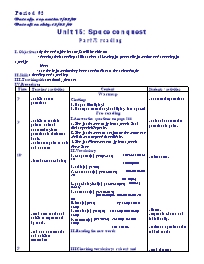Thiết kế bài dạy môn Tiếng Anh 11 - Unit 15: Space conquest - Part A: Reading

I. Objectives: By the end of the lesson, Ss will be able to:
- develop their reading skills such as skimming for general information and scanning for specific
ideas
- use the information they have read to discuss the related topic
II. Skills: Reading and speaking
III. Teaching aids: textbook, pictures
IV. Procedure:
Bạn đang xem tài liệu "Thiết kế bài dạy môn Tiếng Anh 11 - Unit 15: Space conquest - Part A: Reading", để tải tài liệu gốc về máy bạn click vào nút DOWNLOAD ở trên
Period 92 Date of preparation: 7/02/09 Date of teaching: 12/ 02/09 Unit 15: Space conquest Part A: reading I. Objectives: By the end of the lesson, Ss will be able to: - develop their reading skills such as skimming for general information and scanning for specific ideas - use the information they have read to discuss the related topic II. Skills: Reading and speaking III. Teaching aids: textbook, pictures IV. Procedure: Time Teacher’s activities Content Students’ activities 3’ 3’ 10’ 5’ 5’ 12’ 6’ 1’ - ask Ss some questions - ask Ss to work in pairs to ask and answer the given questions in their text book. - ask some pairs to ask and answer - introduce vocabulary - read new words and ask Ss to repeat word by word. - rub out some words and ask Ss to remember - ask Ss to read the text individually in 5’. - ask Ss to do the task individually then compare the answers with a partner. - ask Ss to give answers and explain the reason of their choice. - ask Ss to work in pairs to ask and answer the questions. - call some couples to present - gives suggested answers - ask Ss to work in groups - go around to offer help - ask the leader of each group speak out the answers. - give correct answers - assign homework Warm up Chatting: 1. Do you like flying? 2. Have you ever thought of flying into space? Pre-reading I. Answer the questions on page 166 1. The first human to fly into space is Yuri Alekseyevich Gagarin. 2. The first humans to set foot on the moon are Neil Armstrong and Buzz Aldrin. 3. The first Vietnamese to fly into space is Pham Tuan II. Vocabulary 1. conquest (n) ['kɔηkwest] sự xâm chiếm, sự chinh phục 2. orbit (n) ['ɔ:bit] 3. cosmonaut (n) ['kɔzmənɔ:t] nhà du hành vũ trụ (nga) 4. psychological (a) [,saikə'lɔdʒikl] (thuộc) tâm lý 5. astronaut (n) ['æstrənɔ:t] phi hành gia, nhà du hành vũ tru 6. feat (n) [fi:st] kỳ công, chiến công 7. tension (n) ['ten∫n] sự căng, tình trạng căng 8. extreme (a) [iks'tri:m] vô cùng, tột bực, cùng cực, cực độ II. Reading the new words III. Checking vocabulary: rub out and remember. While-reading * Reading the text * Task 1: Answers: Paragraph 1: B Paragraph 2: D Paragraph 3: E Paragraph 4: C Paragraph 5: A * Task 2: Answers: He was 27 then He was in space for 108 minutes. They were what would happen to human being in space or how the body would react to the extreme changes in temperature or how the mind would deal with the psychological tension It was more than 17,000 miles per hour. Because he died in a plane crash on a routine training flight in March 1968. After his death, his hometown of Gzhatsk was renamed Gagarin, and the Cosmonaut Training Center at Star City, Russian, was given the name of this national hero Post-reading Answers: cosmonaut in space lasted success gravity view impossible named after Homework - learn by heart vocabulary. - redo all the tasks - answer the questions - ask and answer the questions in pairs. - take notes. - listen. - repeat in chorus and individually. - write or speak out the rubbed words - read the text individually. - do the task individually then check with a partner. - give and explain the answers. - work in pairs to do the task - some couples present in front of the class - work in groups - the leader of each group speak out the answers. - take notes
Tài liệu đính kèm:
 UNIT 15 Reading 11CB.doc
UNIT 15 Reading 11CB.doc





